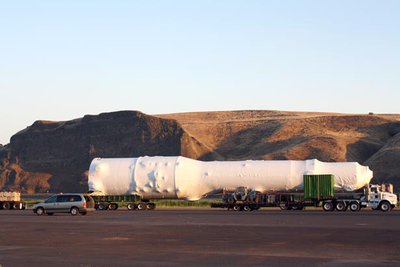
On Nov. 24 massive loads of tar sands equipment — some as long as a football field — will hit the roads of rural Eastern Oregon, traveling from Umatilla through the small towns of Prairie City and John Day to Homedale, Idaho. Activists, Native Americans, rural dwellers and more have been fighting the so-called megaload shipments for three years now in Idaho and Montana, and now the fight has come to Oregon.
A press release from the Oregon Department of Transportation (ODOT) warning Thanksgiving-week travelers that roads will be held up for 20 minutes at a time says the megaloads are of “water purification equipment and parts.” According to the Blue Mountain Eagle, Oregon-based shipping company Omega Morgan confirmed that “the shipments would be parts of giant evaporators, equipment used in power generation and oil sands refinery processes.” The route goes from the Port of Umatilla, east to Pendleton, then south on Hwy. 395 to Mount Vernon and east through John Day and Prairie City on Hwy. 26.
The Canadian tar sands are massive open pit mines that opponents say destroy forests and poison land, water and people in the oil-extraction process. The controversial Keystone XL pipeline, which would ship the dirty tar sands crude across the U.S., and a recent increase in oil-by-rail and oil export proposals in the Northwest are related to climate change-inducing tar sands mining.
In August, the Nez Perce Tribal Council was arrested protesting the megaloads through their lands. Local Native American climate change activist Kayla Godowa Tufti says, “All four Columbia River Treaty Tribes, Umatilla, Yakama, Warm Springs and Nez Perce, issued a resolution opposing the development of the Canadian tar sands oil and the ‘megaloads’ of equipment they require, in August of this year.” She adds, “Though Omega Morgan maintains these evaporators are destined for Nevada, it’s obvious to many of us that this is a blatant lie. From extraction to export, we do not want this destructive industry in our homelands, nor our river. No compromise, no question.”
Holly Zander, a press representative for Omega Morgan, says the company reached out to the Confederated Tribes of the Umatilla Indian Reservation, but the route does not cross tribal lands. It does go through national forest lands. Zander says the loads will not move on the Thanksgiving holiday.
According to ODOT, the first load of water purification equipment and its transport vehicle will be 380 feet long, 23 feet wide and 19 feet tall. The height means the loads cannot be transported on most major highways as they won’t fit under overpasses.
Trish Weber of All Against the Haul, which successfully fought megaloads in Montana, says, “This plan exemplifies the arrogance of Big Oil in thinking that Oregonians will subsidize their transportation costs after they were turned back in Idaho.” She says that Oregonians will “pick up the tab in the form of inconvenience at best and risks to safety and infrastructure at worst.” Weber points out that it was an oversized load carrying housing for drilling equipment that knocked down the I-5 bridge over Washington’s Skagit River last year. The transport company in that instance was Mullen Trucking, a frequent shipper of tar sands equipment. “All other industries build their equipment to fit on our highways, and there is no reason Big Oil shouldn’t either — their desire for profits doesn’t put them above the rules,” she says.
The current load of General Electric water evaporating equipment is scheduled to begin moving Nov. 24, and Christy Jordan, ODOT’s permit manager and freight mobility coordinator, says a permit will not be issued before Nov. 22. Weber says, “ODOT needs to refrain from issuing permits until these applications have undergone a thorough review process, including input from the public.”
Tom Strandberg of ODOT tells EW, “My understanding is that three loads will be part of this permit. There may be requests begin moving additional loads in the future.” He says some fixtures along the route will have to be moved to allow the loads to pass.
Strandberg says representatives of Omega Morgan have been invited to answer questions at the regularly scheduled South East Area Commission on Transportation meeting in Ontario, Ore., on Nov. 25, and an earlier meeting was held in Grant County Nov. 18.
Wild Idaho Rising Tide, which has been protesting and documenting megaloads, is planning “six days of direct action” against the Oregon loads. The group will be joined by 350 Corvallis, Portland Rising Tide and other members of an anti-Keystone XL and anti-fossil fuel infrastructure coalition. For more information go to wildidahorisingtide.org.
Update: The Blue Mountain Eagle is reporting that the loads have hit a snag. The paper is reporting that “Oregon Trail Electric Cooperative (OTEC) says industrial hauler Omega Morgan may have to wait at least two weeks for line work that’s needed before it can begin its controversial megaload transport through Eastern Oregon.”
Update 2: Loads appear to be under way after all.